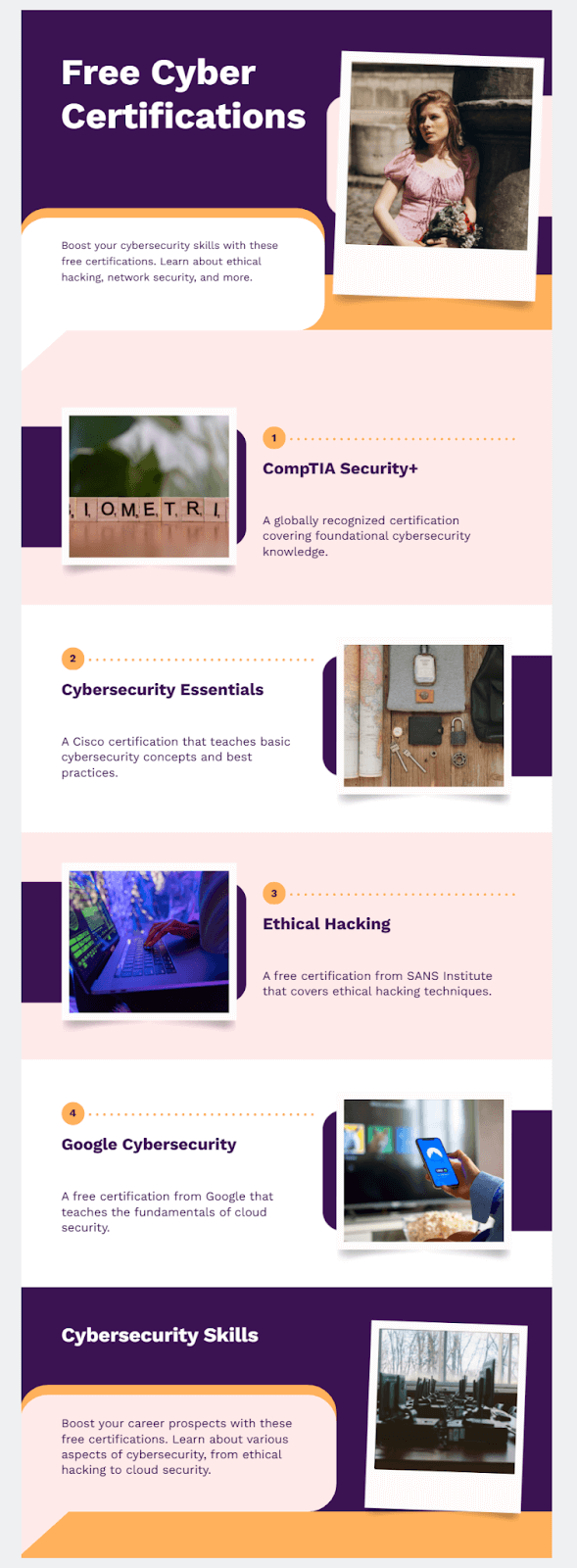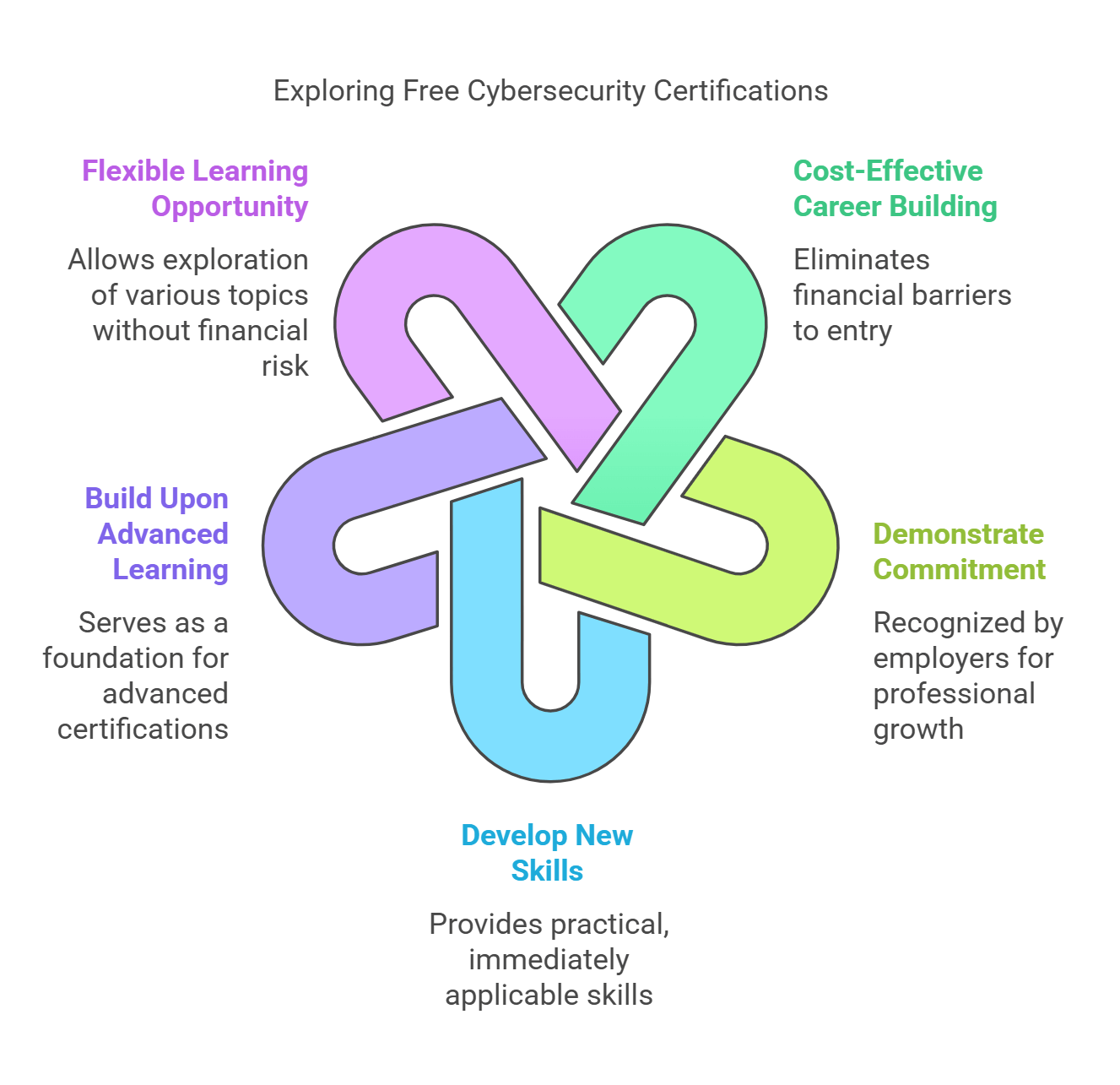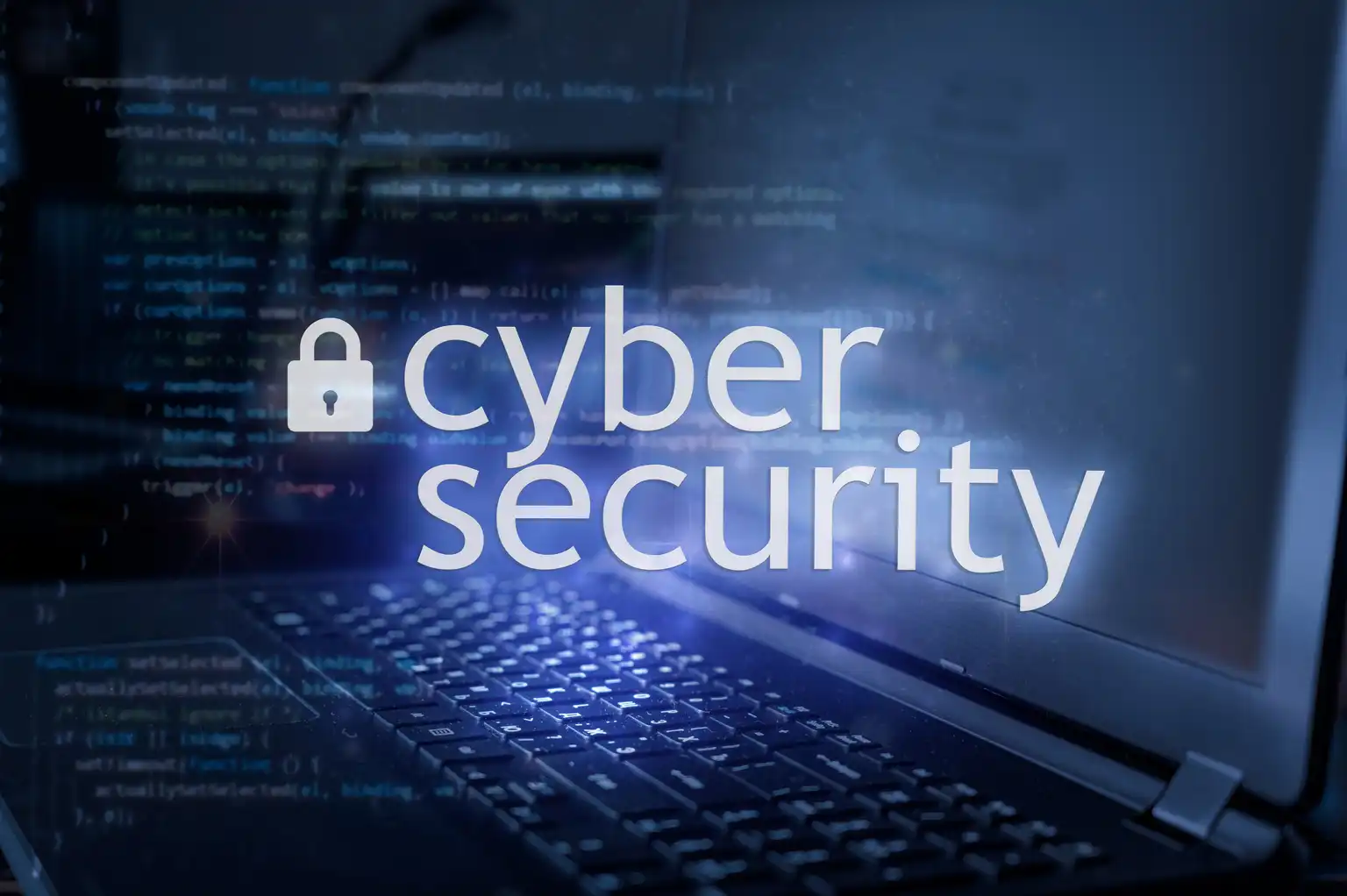Table of Contents
- What Is a Free Cybersecurity Certification?
- Why Do Organizations Offer Free Cybersecurity Certifications?
- Benefits of Free Cybersecurity Certifications
- The Best Free Cybersecurity Certifications
- Challenges of Free Cybersecurity Certifications
- Career Impact of Free Cybersecurity Certifications
- How ACSMI Enhances Free Cybersecurity Certifications
- Final Thoughts
In the rapidly evolving digital world, cybersecurity has become one of the most sought-after fields, with businesses and governments increasingly prioritizing the protection of their digital assets. As a result, cybersecurity certifications are no longer just an advantage—they are essential for securing a role in this high-demand industry. However, many aspiring professionals are deterred by the cost of certifications. Fortunately, a Cybersecurity Certification Course Free presents an accessible entry point for anyone looking to break into the field.
In this guide, we’ll explore how a Cybersecurity Certification Course Free can help you launch a career, the benefits and challenges they come with, and how ACSMI Certification can complement free offerings to take your skills to the next level.

What Is a Free Cybersecurity Certification?
A free cybersecurity certification is a credential awarded by organizations, online platforms, or tech vendors that requires no financial investment. These programs typically offer foundational knowledge and skills in areas like network security, incident response, and cyber risk management. While these certifications don’t always provide the depth of more expensive programs, they give learners a strong entry-level foundation in cybersecurity, making them ideal for newcomers to the field.
By 2025, the growing need for cybersecurity professionals is expected to create an even greater demand for affordable training options. Free certifications offer an opportunity for individuals from diverse backgrounds to gain the necessary skills without facing financial barriers.
Why Do Organizations Offer Free Cybersecurity Certifications?
Free cybersecurity certifications are offered by various organizations, educational platforms, and tech companies, often driven by several key motivations:
1. To Build Talent Pipelines
Companies like Cisco and Fortinet offer free certifications to help create a pool of skilled professionals who may eventually use their products or services. By investing in training for the next generation of cybersecurity experts, these companies ensure that they have a steady supply of qualified individuals to fill future positions.
2. To Increase Cybersecurity Awareness
Given the increasing frequency and sophistication of cyberattacks, organizations, governments, and non-profits use free certification programs to address the global cybersecurity skills gap. They aim to raise awareness about cybersecurity practices and ensure that more individuals understand the basics of protecting digital systems and data.
3. To Encourage Career Transitioning
Free cybersecurity certifications make it easier for people looking to transition into the field from other sectors. For example, professionals with a background in IT, business, or even finance can gain the necessary cybersecurity skills to shift into a new career path without the need for expensive training.
By 2025, the rise of AI, automation, and the cloud will further accelerate the demand for cybersecurity professionals, making the availability of free certifications even more critical.
Benefits of Free Cybersecurity Certifications
While the most obvious benefit of Certification Course Free cybersecurity certifications is the cost savings, there are several other reasons why pursuing Certification Course Free certifications is valuable.

1. Cost-Effective Career Building
Free certifications eliminate the financial obstacles that often accompany traditional education or expensive training programs. Whether you’re a student, career changer, or someone from a low-income background, these certifications provide an affordable way to enter the cybersecurity field and gain valuable knowledge.
2. Demonstrate Commitment
Despite being free, cybersecurity certifications are still recognized by employers as a sign of commitment to professional development. In an industry where continuous learning is critical, having these credentials can demonstrate to potential employers that you’re dedicated to advancing your cybersecurity skills.
3. Develop New Skills
Free cybersecurity certifications offer practical skills that can be used immediately in real-world scenarios. From incident response to malware detection, these programs introduce foundational skills that form the building blocks of more advanced training and job-specific roles.
4. Build Upon Advanced Learning
Free certifications provide the groundwork for more specialized or advanced certifications. Once you’ve mastered the basics with a program like Cisco Networking Academy or Microsoft Security Fundamentals, you can progress to certifications like CISSP or ACSMI that delve into more complex cybersecurity concepts.
5. Flexible Learning Opportunity
One of the main advantages of free cybersecurity certifications is the flexibility they offer. With no upfront financial commitment, learners can explore a variety of topics—such as penetration testing, cloud security, or incident response—before deciding which area to specialize in. This flexibility allows individuals to make more informed decisions about their career paths.
The Best Free Cybersecurity Certifications
For those looking to start or expand their cybersecurity careers, the following free certifications are great options. Each provides a solid foundation and valuable experience for beginners:

1. Cisco Networking Academy – Introduction to Cybersecurity
-
Cost: Free
-
Focus: Covers the basics of cybersecurity, including threats, vulnerabilities, and mitigation strategies.
-
Good For: Beginners looking to enter the cybersecurity field and gain an understanding of core concepts like network security.
2. Fortinet NSE Training Levels 1 – 3
-
Cost: Free
-
Focus: Provides foundational knowledge of network security concepts and practices, ideal for those interested in endpoint protection and network defense.
-
Good For: Individuals aiming to understand network security protocols and build a career in network operations or endpoint security.
3. Microsoft Security Fundamentals
-
Cost: Free (for eligible learners)
-
Focus: Teaches fundamental security skills related to endpoints, compliance, and cloud security.
-
Good For: Professionals intending to work with Microsoft solutions or those wanting to dive into cloud security.
4. ACSMI Certification Foundation Modules
-
Cost: Free for basic foundational modules
-
Focus: Covers the basics of threat detection, network security, and incident response. ACSMI combines theory with practical labs.
-
Good For: Beginners looking for more structured learning with access to hands-on practice and foundational cybersecurity knowledge.
Challenges of Free Cybersecurity Certifications
While free certifications can offer a solid foundation, they come with some challenges that learners should be aware of:
1. Limited Recognition
Many free certifications don’t carry the same weight as well-established paid programs like CISSP or CEH (Certified Ethical Hacker). Employers may recognize free certifications, but for more specialized roles or senior positions, they may prefer more advanced credentials.
2. Hindered Specialization
Most free certifications cover only basic or general knowledge of cybersecurity. While these are excellent for getting started, they lack the depth required for more specialized areas such as cloud security, penetration testing, and forensics. For those interested in niche roles, further education or certifications like ACSMI will be needed.
3. Absence of Practical Experience
Although free certifications often include theoretical knowledge, hands-on labs or real-world scenarios may be lacking. ACSMI, for instance, provides interactive simulations and real-world application exercises, which are crucial for those looking to master job-specific skills.
Career Impact of Free Cybersecurity Certifications
A free cybersecurity certification can open doors at different stages of your career. Here’s how they can impact your professional trajectory:

For Beginners
Free certifications are an excellent way to enter the cybersecurity field. By gaining a basic understanding of security principles, incident response, and network security, you’ll be prepared for entry-level roles such as Security Analyst or IT Support Specialist. As you gain experience, you can move on to more advanced certifications.
For Mid-Level Professionals
Professionals already in the field can use free certifications to bridge knowledge gaps and enhance their skill set. Combining these with intermediate-level certifications such as ACSMI modules can help you transition into roles like Penetration Tester or Risk Analyst.
For Advanced Learners
While free certifications provide a strong foundation, they are unlikely to be sufficient for leadership roles. However, they can reinforce your learning foundation. ACSMI’s advanced training will be necessary for those aspiring to reach CISO or Cloud Security Architect positions.
How ACSMI Enhances Free Cybersecurity Certifications
While free certifications give you a good start, ACSMI provides the additional depth and specialization that sets you apart in the competitive cybersecurity market. Here’s how ACSMI builds on free programs:
Modular Learning Paths
With over 400 modules, ACSMI offers tailored learning paths that align with your career goals. Whether you’re interested in cloud security, ethical hacking, or blockchain security, ACSMI’s structured pathways allow you to focus on specific areas of cybersecurity that will enhance your expertise.
Real-World Application
ACSMI includes interactive labs that simulate real-world scenarios. These hands-on experiences help learners apply the theoretical knowledge gained in free certifications to real cybersecurity challenges, bridging the gap between learning and practice.
Guided Career Progression
ACSMI offers a clear progression from basic concepts to advanced competencies. This structured approach makes it easier to transition from an entry-level role into more specialized positions, such as Penetration Tester or Cloud Security Engineer.
Final Thoughts
The availability of free cybersecurity certifications is a fantastic opportunity for anyone looking to enter the field without financial barriers. Programs like Google, Cisco, and Microsoft provide essential knowledge and skills, making it possible to get started in a high-demand industry without breaking the bank. However, to truly excel and specialize in cybersecurity, it’s crucial to pair free certifications with more advanced programs like ACSMI. By combining foundational learning with advanced expertise, you can significantly enhance your career prospects and position yourself as an expert in the evolving cybersecurity landscape.
As we move into 2025, the demand for cybersecurity professionals is only expected to grow, with increasing threats and technological advancements shaping the industry. Starting with free certifications is a great way to break in, but continuous learning, through advanced certifications and practical experience, is the key to a long-term and successful career in cybersecurity.
1. Are free cybersecurity certifications enough to land a job?
Free certifications are a great starting point and provide a solid foundation for entry-level roles. However, to stand out in a competitive job market, it’s advisable to pair free certifications with more advanced training, such as ACSMI or CISSP, which offer in-depth expertise.
2. How do free cybersecurity certifications compare to paid ones?
Free certifications are ideal for beginners and offer a cost-effective way to gain essential skills. Paid certifications, however, tend to offer deeper knowledge, specialization, and greater recognition among employers, especially for advanced roles.
3. Do free cybersecurity certifications expire?
Some free certifications may require periodic renewal or may have an indefinite validity. It’s essential to check the issuing organization’s terms and conditions regarding expiration and renewal requirements.
4. Can I specialize in cybersecurity with free certifications?
While free certifications cover fundamental cybersecurity principles, specialized topics such as cloud security, penetration testing, and ethical hacking usually require more advanced certifications like ACSMI.
5. Which free cybersecurity certifications are best for beginners?
For beginners, the Cisco Networking Academy and Microsoft Security Fundamentals are excellent starting points. They provide a solid foundation in network security, incident response, and compliance, which are crucial for entry-level positions.
6. How long does it take to complete a free cybersecurity certification?
The duration of free cybersecurity certifications varies, but most can be completed in a few weeks to a few months. Programs like the Google Cybersecurity Certificate are designed to be completed within 3 to 6 months, depending on your pace and prior experience.
7. Can I transition into cybersecurity from a non-IT background with free certifications?
Yes! Free cybersecurity certifications are ideal for individuals transitioning from non-IT backgrounds. They help bridge the gap by providing essential knowledge, allowing career switchers to gain confidence and skills to enter the cybersecurity workforce.
8. Are free cybersecurity certifications recognized by employers?
While free certifications are valuable and recognized by employers, especially for entry-level positions, advanced or specialized certifications (like CISSP or ACSMI) are often preferred for mid-level or senior roles due to their comprehensive nature.

Leave a Reply